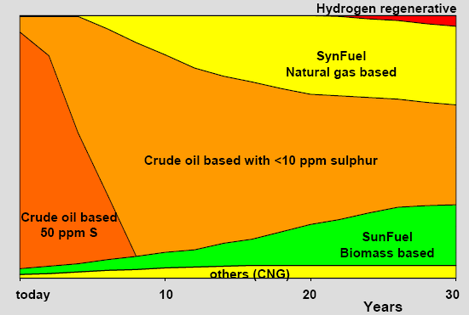The European Union demands biofuels to make up an average 5.75 percent of transportation fuels by 2010 and 10 percent by 2020. This will help meet the climate change objectives as well as contribute to securing of energy supply. Biofuels currently account for about only 1 percent of EU fuel consumption today, which means there still is a long way to go in the forthcoming years to meet the demands. The renewable biofuels should satisfy several criteria before they can be used as transportation fuel:
- Compatible with the existing petroleum based infra structure;
- Compatible with present and future engines and vehicles;
- Competitive with petroleum-based fuels.

Figure: Fuel diversification Scenario Europe (from VW, Dr. Steiger)
As the price of petroleum-based fuels is rising steadily, an increasing number of technologies become economically feasible for the production of biofuels. Biofuels can be made from food crops (first generation, like for instance bio-diesel from rapeseed or bio-ethanol from corn); non-food feedstock (second generation; like oils derived from straw or wood) or genetically modified feedstock (third generation, like biofuels from genetically modified algae). Because the production and use of biofuels is relatively new, there are a lot of fundamental and technical uncertainties, especially with respect to the production of second and third generation biofuels.
Second generation biofuels obtained via thermochemical conversion of biomass are quickly gaining momentum and have several advantages above first generation biofuels:
- A wide variety of feedstock is possible, including waste materials (wood, straw etc.);
- The cultivation process (if any) could be environmentally less intensive.
To obtain real transportation fuels from lignocellulosic biomass (second generation) intensive thermo chemical treatment is needed. There are various options to do this:
Gasify biomass to gaseous products like methane or hydrogen (from syngas) and subsequently use these gases directly as transportation fuel or convert these gases into liquid transportation fuels (Biomass To Liquid processes using Fischer Tropsch technology).
Use relatively low temperature processes like pyrolysis and solvolysis (among others hydrolysis) to convert the building blocks of biomass –cellulose, hemicellulose and lignin-, into an oil rich product. This product, being rich in oxygen/water, needs upgrading before it can be processed in refineries for the production of transportation fuel.
The research in the TCCB group not only focuses on the above mentioned primary thermo-chemical conversion processes of biomass, but also on the subsequent upgrading of the products obtained via pyrolysis/solvolysis processes. These upgrading processes should make the bio-liquids suitable for co-refining in traditional petroleum based refineries. Typical upgrading processes are:
- High Pressure Thermal Treatment: the pyrolysis oil is subjected to high pressure and temperature, resulting in an organic/aqueous phase split accompanied by de-oxygenation of the oil phase.
- Catalytic Deoxygenation, which is basically a similar process as HPTT however, now also a catalyst is used to deoxygenate the oil;
- HydroDeOxygenation: in this process the pyrolysis oil is subjected to hydrogen at high pressure and temperature in the presence of a catalyst. This not only leads to deoxygenation of the oil but also the H/C ratio is increased.
